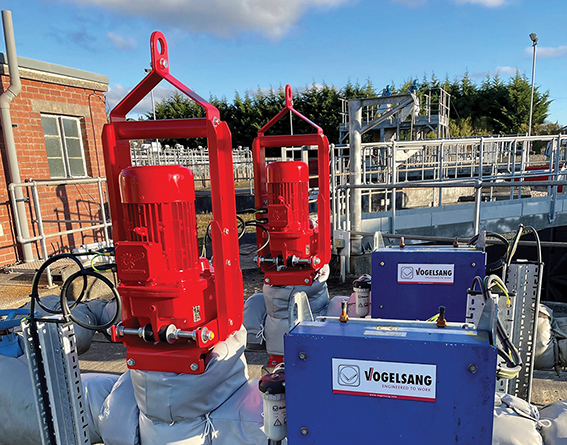By Drew McCulloch Area Sales Manager at Vogelsang
Despite the warnings, cloths, wet wipes and other foreign matter will always find their way into the sewage treatment process. Ragging is a problem that is growing, and is an issue wastewater treatment works must address if they want to keep downtime – and maintenance costs – manageable.
It’s no small matter either; it causes havoc for maintenance staff who are tasked with unclogging a ragged-up pump and pipework, and an expensive problem for the water authorities. Regular blockages can rack-up hundreds of hours of unplanned maintenance, not to mention the expense of replacement parts as pumps and motors are damaged in the process.
This was an issue at Scottish Water’s Castle Douglas wastewater treatment works when their previously installed diaphragm pumps on their Storm Return application were simply ‘not up to the job’,’ according to Scottish Water’s E&M Technical Support Manager.
During storm conditions, the tanks would fill with largely unscreened raw sewage and sludge. And whilst the majority of the water could be returned to the head of the works by gravity, the residual sludge was thick and heavily laden with rags and foreign bodies – and the diaphragm pumps were often blocked or in need of repair.
Macerators acting as a protective barrier to equipment downstream
Initially, the diaphragm pumps were replaced solely by Vogelsang rotary lobe pumps. The strong suction capability of the pump allowed the thickest sludge to be lifted reliably from the bottom of the storm tanks and transferred to nearby storage tanks. The maintenance in-situ design also meant that any replacement wearing parts can be changed quickly with minimal downtime.
After 5 years of operation however, it was noted that the rag content of the sludge was increasing, and the pumps were requiring more attention as a result. A decision was made to install a Vogelsang XRipper grinder upstream of the lobe pumps, resulting in smooth running operation with zero blockages and a significant reduction in maintenance.
Scottish Water were experiencing a similar situation at various points at their nearby Troqueer wastewater treatment works. Unscreened imported sludge is decanted from road tankers into a holding tank, whilst simultaneously being pumped forward through a strain press to remove the rag and debris. Unfortunately, the centrifugal pumps installed to do this continuously became blocked and the decanting process could take up to 10 times as long to complete.
“At times we would have a queue of tankers waiting to discharge and unable to because the centrifugal pump was blocked. The same thing would happen to the standby pump, so the whole system wasn’t working,” said the E&M Technical Support Manager.
System stoppages can be all but eliminated
To prevent stoppages, Vogelsang recommended the Rotary Lobe Pump and XRipper grinder combination, which was installed at the sludge reception tank. The duty/standby installation has resulted in almost zero downtime, and with an increase in throughput of 10 l/s per second over the previous set up, the turnaround in tankers has never been quicker.
In addition to the tanker offloading system, a similar set up was installed for desludging the primary settlement tanks. The previously installed progressive cavity pumps proved to be expensive and time consuming to maintain.
“We’ve been so impressed with the efficiency of the rotary lobe pump and XRipper grinder combo. They’re simple enough for our team to maintain without the need for external assistance,” said the E&M Technical Support Manager. “The fact we can get this combination of pumps and grinders installed and leave them to do their job has given us peace of mind.”




